Text
Expressions + Mannerisms (part 2)
By semi-popular demand, another analysis of Solas and his expressions :)
For all you fanfiction writers and solavellans!
I would like to state, for the record, a lot of what I say/have said is purely my own personal interpretations and understandings, and by no means should you take my word as gospel here. This is just some fun :)
I stated in a previous post (I shall call 'Part 1' for simplicity) how Solas has 2 expressions; his 'in the moment' expressions, in which his true feelings are on display, and his 'in character' expressions, in which he's very much putting on a persona.
If you're in solavellan hell, have some hyperfixation-tendencies and/or unresolved feelings towards a specific fictional character (like myself), you'll probably be able to tell the difference between these 2 expressive states of his.
Allow me to elaborate ;)
Solas, In the Moment "when he's honest/caught off-guard/not 'in character'"
Solas clearly has trouble with lying; he's rather terrible at it. I would go so far as to say he only ever lies to you once in the entire game (lying outright, I mean); and it is after the Winter Palace;
"You miss court intrigue... When were you at court?"
"Oh. Well, never... Directly, of course." <- big stuttering liar.
He can't lie worth a damn, but he's by no means honest; he's manipulative, deceptive and sly. I believe I heard someone describe him once as having a 'malicious compliance with/towards the truth'.
I believe his expressions, as well as mannerisms, follow this mentality.
I'll show you several images/scenes in which I believe Solas is being honest/showing himself without his guard up. (And in 2. Solas, In Character, I will show you the contrast).
This one will be hard to show without gifs (which I'm clueless on how to create, forgive me);
A. He blinks a lot, very a-rhythmic.
B. He gets this look about him, and I don't know how to describe it, beyond "'scuse me?" (the long face gets longer, shrug)
Genuinely surprised:
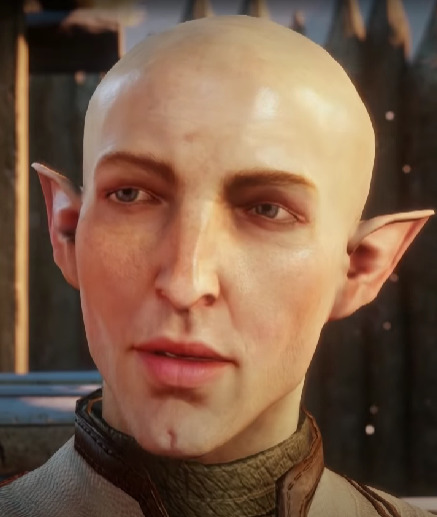
C. He looks very deep in thought/far away - and sad (this man needs some therapy) this is the face he makes when he knows no-one can see him (I'll make a part 3 going into these comparatives of 'you can see me'/'you can't see me');
No ones looking, it's okay (it's not, but whatever) face :
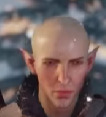
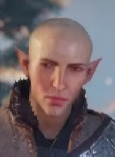



D. He just looks sad when he's being quiet/honest/not putting on some bravado/persona. (You know how 'resting bitch face' is a thing? This man has a resting depressed face, and i think it has to do with the tragedy - he practically embodies philosophical pessimism)
Acceptance/I don't see a way forward/I need a break face:


E. He has the softest look about him when he's touched/shown affection (yes these are all from the dream-kiss scene) (bless my poor solavellan heart)
Yes, I like to be held, please kiss me on my face face:

F. Smug face... He has a smug face (to be fair, this is literally him revealing he has complete control over when you're awake/asleep... and much more, given the context of Tevinter Nights - idk this face always creeped me out actually XD like i knoooow this guy could fuck me up if he wanted)
"It's my world, you're all just living in it" face:
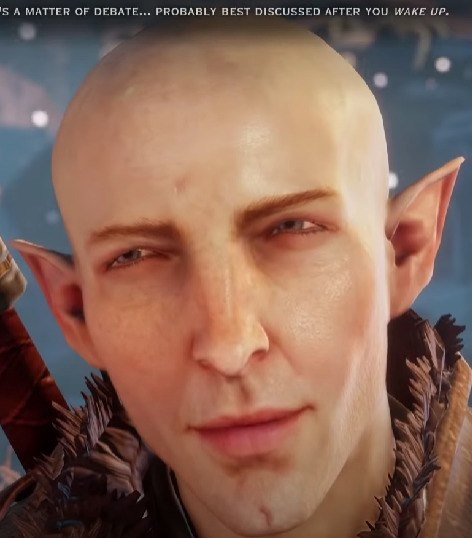
G. He fidgets a lot when it's just him, or he's talking to you honestly. Like he always has to be doing something with his hands. (I noticed he doesn't do it when he's in groups, or with others) - not a facial expression but I thought it was interesting behaviour. In fact, his movements in general increase a lot - he fidgeted, he sways, he wobbles, he gestures, moves his head a lot. (Just watch all of his personal quest, you'll see what I mean). (He also does this when you first meet him, but I chalk it up to he's just super excited that you're not dead and finally you can fix his mess - since he was 100% sure you'd be dead and he was ready to bolt with his 'i didn't say it was a good plan' plan)

At the risk of just listing typically behaviour in people with certain emotions, I'll move on to his 'in character' part.
2. Solas, In Character.
A. He blinks rhythmically, every like... 5/6 seconds?? (yeah, I know... I do have a hobby besides this stuff i swear XD i just like this egg). It's soothing, like a heartbeat. The blinking just always stood out to me with his character, idk.
B. He smiles a lot, but I can't tell if I know who he is and what he's doing, and that's clouding my vision, but it feels very much like a job interview kind of smile. Like, every split second it falters just a bit.
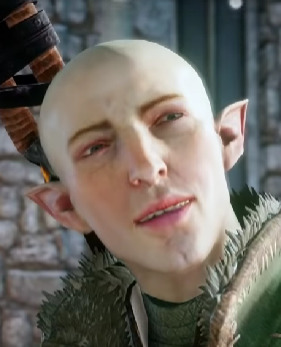
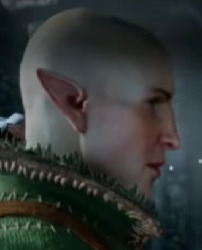
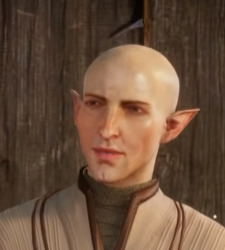
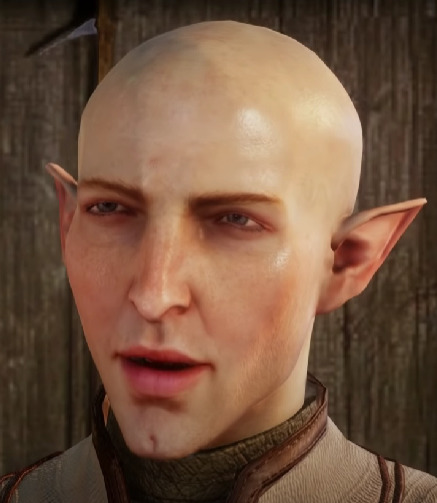
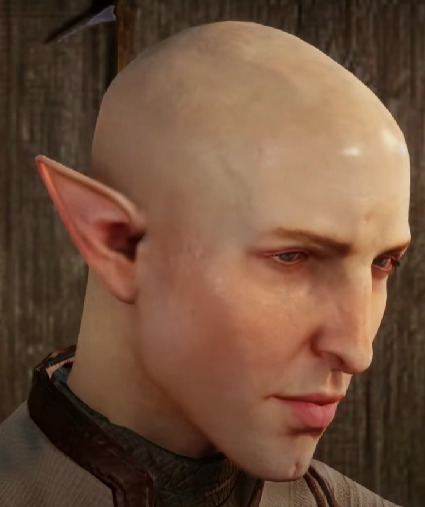
This man just doesn't want to smile (though, I suppose this is early in game when he's very much 'these aren't people' 'oh i have to pretend really hard rn'
C. He stands pretty damn still and stiff - if he's doing this i'm 99% sure he's being manipulative with you, sometimes the only movements he has in a scene is him blinking, perhaps glancing sideways. - think just before the journey to skyhold when he gives you a talk about the orb and how you need to prove yourself - he's in 110% manipulative mode
The trouble with Solas is, he doesn't have many tells - but the ones he does have are big. And, without delving into scenes as they stand, I'd have a hard time expressing this.
But I will leave you with my favourite expression-transition in the entire game.


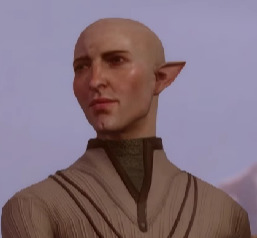
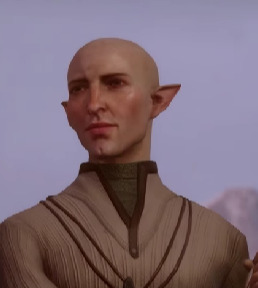
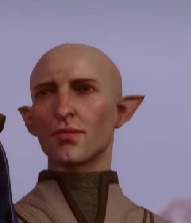

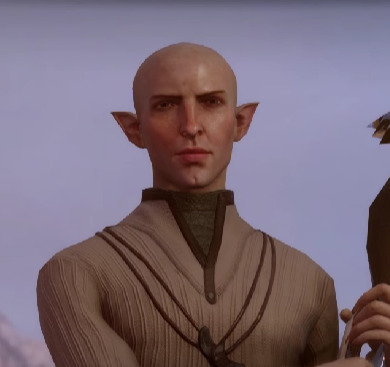

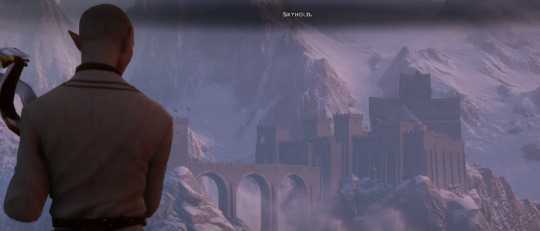
How he goes from optimism/pride when standing beside Inky, to when the figure passes him, his expression becomes so serious/foreboding. I love it so much.
And I once again want to mention how much I just adore the little details of animation, from eye movement, skin twitches, or full on bodily movement. - especially for a character I adore. It's beautiful to look at, especially as someone who studied animation (absolutely wasted degree on me, I swear) and gets very attached to fictional characters (particularly ones as complicated as the dread egg).
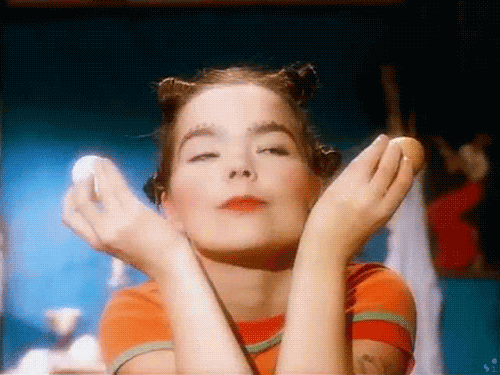
In future parts, provided I get flycam to work on my pc - I'll be able to go through scenes of the egg to give him a bit more of an in-depth view (with gifs and whatnot, can you imagine?).
134 notes
·
View notes
Text
Okay. One. One more unhinged rant. For the day at least
One of the most common criticisms of Solavellan I see is Solas sees Lavellan as a "not like other girls" type. While I sort of understand how someone could get this idea given Solas' reputation in the fandom, this interpretation entirely relies on fanon
That fanon is not built on nothing though, because Solas himself entertains this at one point during the romance. In the second scene, during the kiss on the balcony, he asks both a romanced (and unromanced!) Inquisitor if the existence of the anchor has changed them in how they act. Solas is still at this point convincing himself that all the people in this world are fake and he is doing them all a favor in his ultimate plan, but when the Inquisitor confirms that no, they weren't any different before the anchor. Solas has to come to terms with that, and it is the first step into him going: Shit, I think this world has merit
The entire point of BOTH Solas' romance and friendship path is that the Inquisitor is not special and if Solas faces that it means he's dooming a world full of people just as rich as them to death to restore an already dead world, and that thought scares him so badly he runs
In the grove scene, where Solas leaves Lavellan, you can find people saying he does that because he realized just how in love he was with Lavellan and he panicked and ran. He's good at that. But what I don't see discussed as often is the broader why to that response
Patrick Weekes confirmed that Solas didn't bring Lavellan into the grove to tell them about the Vallaslin. He was going to tell them he was the Dread Wolf and what his plan was, but at the final moment he chickens out, and tells them about the Vallaslin instead (Solas' greatest modern flaw is not pride, it is cowardice, but that is an unhinged rant for another day)
And then after it hit him what he was about to do, how he was going to give it up all for them, and again here comes that pesky "Lavellan is not special" realization he's been struggling with. Because if he could give it up for Lavellan, if they were worth it, then that means there could be a thousand, a million more like them in the world. A million more that are worth it, and what could be worse for him than that?
My final piece of evidence is this: Cole says this straight up in a post-breakup banter with Solas

Conclusion: Solas is a deeply flawed person, often insufferable and I will always roast him but he is well written and occasionally the misunderstanding of his character by the fandom irritates me :)
1K notes
·
View notes
Text
Why not try a coup (in Kirkwall)?
Do you think there is any reason, in-universe at least, that (a very pro-mage/anti-Circle) Hawke and Anders couldn’t simply carry out a coup? By Act 3, Hawke is overwhelmingly the most popular and one of the wealthiest individuals in the city, has earned the title of “Champion,” and has the appropriate noble background (as an Amell). Meredith (who appears at least somewhat aware of her own unpopularity) seems to be aggressively courting his support for this very reason. There is a conspiracy of nobles eager to unseat Meredith and see Hawke made Viscount (a plot point which seemed to be suddenly dropped without explanation?), and Hawke also seems to have the support of the common people (and Anders the support of the underclass/very large refugee population, if nothing else, to the extent that a large mob of muggles is eager to attack a heavily-armed Hawke and co. merely on the suspicion that they might want to threaten their healer). I made my Hawke keep simply asking for power at every opportunity, and the only person who seemed unhappy/reluctant about this was Meredith (and perhaps Elthina, although I don’t quite remember). Hawke also has the support of the City Guard, which is clearly resentful of Meredith’s attempts to displace them, and especially its captain Aveline (who ultimately sides with him regardless of which faction he ends up choosing post-Chantry-boom). When talking to King Alistair (who my mage HoF asked to abolish the Circle at the end of Origins), he seemed eager to see Hawke as ruler of Kirkwall, said he would help if he could, and openly wished he could kick out the Templars (or at least reduce their power) in his own kingdom - likely meaning, if not Ferelden material/military support for a Kirkwall coup, then instant recognition and likely alliance post-coup, regardless of (or perhaps even because of?) policy regarding the Circle. Even though the Arishok is dead (at least in my world, since I would never turn over Isabela), he repeatedly expressed that Hawke was the only individual in the city worthy of respect, an opinion likely communicated to his superiors back home - meaning that even Qunari support might be a possibility (at least if intentions to abolish the Circle are not communicated beforehand). Orsino (the nominal leader of and quite popular within the Circle) clearly supported Hawke (at least a pro-mage or anti-Meredith Hawke), if nothing else out of fear of further repression or annihilation by the Templars, meaning that Circle mages (again, if nothing else, at least out of fear of/hostility to Meredith) would overwhelmingly support Hawke’s candidacy and probably his attempts to fight for their freedom as well. As for Anders, while “radical” with regard to the Circle, he never once criticizes aristocracy, monarchy, or the military as institutions and appears happy living in the lavish Hawke estate with servants - nothing in his character, speech, or actions indicated to me a preference for popular uprising or Che-style guerrilla warfare. In fact, given his obvious guilt and self-loathing post-Chantry-boom, it’s clear that he saw such an attack as a last resort in liberating the Gallows and preventing outright genocide. I see no reason why he wouldn’t support a simple takeover by an openly pro-mage/anti-Circle Hawke, especially given that his attack on the Chantry (in my view) presupposes that Hawke and co. and the Circle mages would be willing and able to take on the Templars successfully in battle. If Hawke simply announced his intentions to all supporters, waltzed into the Viscount’s Keep and appointed himself the new Viscount, and then just declared the Circle free and/or self-governing (as Leliana does if made Divine at the end of Inquisition) and demanded that Meredith resign and the Templars disband, under threat of force, this would almost certainly trigger a showdown with Meredith and the Templars. Considering that post-Chantry-destruction, Hawke and co. are clearly able to carry popular support and win the battle, I don’t see why they couldn’t do so with a Viscount!Hawke. Regardless of whether or not Meredith in response invokes the Right of Annulment or simply attacks Hawke and his forces directly and immediately, the announcement of Circle abolition and resulting clash would very probably trigger the same polarizing response in the Circles across Thedas (that the Chantry boom, subsequent Annulment, and battle did in the actual DA2 ending). The conclave and independence votes would likely still happen, and Hawke would still be seen as a liberator among the mages (as Varric’s epilogue says for the actual sides-with-mages DA2 ending). The main differences (for a pro-mage/anti-Circle Hawke siding with the mages) would likely be fewer casualties among residents of the Kirkwall Circle, Anders not being perceived by Circle mages and much of the fandom as a madman/terrorist/dangerous evil extremist (at least under this particular ending), and Hawke and Anders fighting to liberate the Circles from a position of power and high status, rather than as fugitives, which would in my opinion be a happier ending and still maintain much of the setup/background for Inquisition. Do you have any thoughts in this regard?
You make some interesting points, enough that sure, I can see Hawke even succeeding in this. But the big challenge would be holding onto power, because the Chantry would no doubt intervene and perhaps even call an Exalted March on Kirkwall.
155 notes
·
View notes
Note
"#i do have a theory that she barred carver from the guard because he would challenge her authority #hard to get away with being a corrupt leader when someone holds you accountable" *Rests chin in hands* Tell me more?
I’m not the best at articulating my thoughts but I’ll do my best!! Sorry if it gets a bit long!
In short, I believe Aveline just used the fact that he’s around 19 - 20 years of age in Act 1 as a way of getting people to not take him seriously and calling him too immature, despite the fact the he was a soldier just like she was.
It’s true Carver’s not the epitome of maturity at this point, but he’s not a child nor is he any less qualified for a position in the Guard than Aveline. And in a city where no one knows them, it would be easy for Aveline to go behind his back to the guard and convince them he’s unfit for the role.
It’s no secret that Carver, despite being very vocal on his opinions, was very much a respected soldier while at Ostagar. From World of Thedas Volume 2:
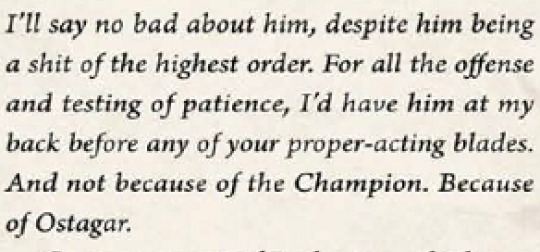

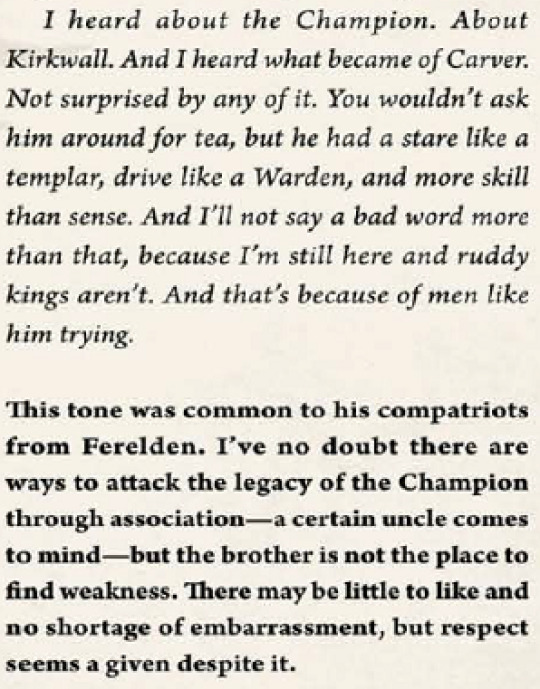
He voices what on his mind even if it wouldn’t earn him any favour, yet he was well respected and mostly talked about at a high regard.
And Aveline was at Ostagar. Though he didn’t recognise her, she recognised and knew about him - she says as much in the Prologue. She would’ve known that he was respected among his fellow soldiers. And she even admits in the Prologue that he’s a skilled soldier (though Carver shoots down the praise but I feel like that’s impostor syndrome coming into play here).

By Act 1, she’s had a year to get to know him better. He’s a skilled warrior and is able to earn the respect of his fellow soldiers while also being vocal about things he disagrees with, and thus he’s a threat.
Their dialogue with each other during Act 1 is very telling. He sees right through her, and she tries to deflect by seeing herself as above him (and this sort of attitude also extends to the other companions, too).

He makes jabs at her relating to the Fereldan refugees. He knows she only cares about herself and her social standing.

She acts like his situation is a result of a flaw of personality instead of her own doing to frame him as a brat and too immature for real work. Carver makes a point to say that she knows that this is the only chance they have, especially as she holds a great deal of blame for that.

Another example of Carver calling Aveline out on her bullshit acting like she’s somehow a better soldier than he is, despite the fact that Carver has been stated to have been on par, if not more skilled, than the trained officers at Ostagar and was able to single-handedly carve a dent in the darkspawn hoard.
(Note: as it’s not easy to tell in text, the “Yes ma’am” was said in a sarcastic tone.)

Aveline time and again actively belittles Carver and tries to get rid of him. If she can get people of her choosing to not take him seriously as a soldier and act like he’s out of control and unworthy of honest work, then he won’t be in the picture to hold her accountable for whatever she does in the Guard.

Also, a good point to make in relation to your gifset of the conversation:
Aveline: There is a lot of pressure to make the city guard more like the Templars. Cage potential troublemakers just in case. Can’t imagine you’d like that.
Hawke: You’d be a fool to try it. People would revolt.
Aveline: Criminals would revolt.
Hawke: They aren’t people? How big would your gallows be?
The people who are the most vulnerable to get into criminal activities for survival are refugees - just like Hawke and Carver when they arrived in Kirkwall. The very people she sees as would-be criminals are also the people she fails to protect.
She coddles her guardsmen and allows them to pick the easiest areas to protect, leaving the places that need the most help to be vulnerable. But hey, the more refugees to become criminals, the more people lock up, right?
And Carver saw this from the start. Granted, had he’d known that Aveline would rather avenge a rapist guardsman instead of holding him accountable, or how her incompetence and disregard to Emeric’s investigation was a factor in the gruesome murder of his mother, I’m sure he’d call her out for it. And if he were a guardsman, I personally believe he would take matters into his own hands.
But, of course, at this point, Carver’s not around to do so because he’s either a Warden or a Templar.
Now, I’m not going to claim it’s any more than a theory that Aveline actively tried to silence, belittle and get rid of Carver so that the most likely person (aside from Hawke if in rivalry) wouldn’t be able to be able to question her authority and hold her accountable, but to me it seems like she actively tried to sabotage him.
I’m not sure if I were successful in getting my thoughts across, but I hope any of this makes sense!!
630 notes
·
View notes
Text
I'm sorry, but Aveline is a piece of shit half of the game and it makes me mad how many people don't see it but treat the poc and queer characters like the villains in the story
Like, before you say "it's because she isn't feminine and bla bla that you hate her", no, really no, I had the biggest crush on her when started the game
But people usually ignores that:
-She sends Hawke to do her job because she doesn't want her men to do it
-She ignored the elves when they told her about a guardsman r*ping their sister and said that those are only rumors, so yeah she is one of the reasons why the Qunari attacked Kirkwall in the first place (+ if Hawke asks her about this she only says "yOu aRE nOt HelPiNg HaWkE")
-Her punishment for guardsman receiving bribes is only 10 days on the wall and if I remember correctly, the guardsman who r*ped the elf received some kind of punishment like that
-She didn't let Carver join the guard, Carver who was a refugee who lived in poverty with his family and had to join the mercenaries/smugglers to eat
-She refused to investigate with her men the serial killer's case that ended up taking Hawke's mother life (and if you say this to her, she gets mad)
-If you don't agree with her, she literally punches you repeatedly on the floor, what a great and mature guard captain
-She ends up marrying one of her employees, and if you don't get them together, he hates her, so, yeah, that's weird
-If the people she is chasing go to the sewers, they are gone and guards don't go after them anymore (she literally say this if you go to Darktown)
-One of her banters with Anders is she asking how to hunt apostates
-All the Isabella vs Aveline thing
-Spies on Carver like a creep
And there are more things, but you get my point
Look, you can like her, not saying that, but usually people think that she is some kind of saint who didn't do shit because the game wants you to think she is the "voice of reason" when she is just as corrupt as the previous captain of the guard and can be a horrible friend to Hawke.
121 notes
·
View notes
Text
Meta-Analysis of the Rift Mage Specialization
I said in February I was going to do it, and it only took me seven months to follow through!
Anyway. Analyzing game-play elements for narratives purposes has become somewhat of a hobby of mine ever since I really got into GameLit. Then, I started "fangs" and felt that my fight scenes were boring, so I build ability trees reminiscent of DA:I's for my OCs. You know, as you do. During that process, though, the lack of banter acknowledging several choices struck me as odd. Especially regarding specializations. Especially when it comes to Solas'.
We’ll be taking a look at (in order)
1. Description
2. Codex Entry
3. Skills
a. in comparison to DA: II’s Primal & Force Mage
4. Specialization Dialogue with Solas
5. Conclusion
Disclaimer: I talk a lot (this post might have about 2.5k). And, I promise you, you'll be tired of seeing 'the Fade this' and 'the Veil that' at the end of it.
Description
“These mages draw upon the force of the Fade, either pulling matter from the Fade to attack or twisting the Veil itself into a weapon to stagger or crush their enemies.”
[source – DA wiki; bolding mine]
So, lore-wise, mages do ‘draw upon the Fade’. Sure. But do they ‘pull matter from the Fade’? Absolutely not.
Physical things and the Fade rarely mix well. Plus – this is mainly my theory – the way magic is utilized (the 'drawing upon the Fade part') requires it to pass through the Veil. Magic being a form of energy, and thus not physical, does not constitute to ‘pulling matter from the Fade’.
That's the first thing other mages (read: Dorian, Vivienne, possible the Inquisitor) should (or could) have referenced in banter/dialogue.
The rest of the sentence ('twisting the Veil into a weapon') is also highly interesting, since there is little known about the Veil. Nobody knows how it works. And, thus, nobody should be capable enough to manipulate it consistently enough to use it as a weapon. But considering it's Solas who gets this specialization - well. He knows the Veil well enough, don't you think? (Which is why I think Rift Mage should have been Solas' personal, individual specialization like Fenris' Lyrium Ghost, but I just really like personalized skill trees in general.)
However, having answered that question, connecting magic so closely to the very thing can be described as a “magical vibration that repels the Fade”, I'm curious about how it would work. Since, you know, mages are inevitably tied to the Fade. Wouldn't the Veil repel a try to manipulate it by a mage? Is using mana the same thing as drawing energy from the Fade? If so, it would be straight-up impossible to actually use such a method for any ordinary mage (read: not Solas). If mana can be used without the Fade, it would be possible, but is such a thing feasible? Can you switch between spells and Veil quickly enough without horrific consequences such as possibly tearing yourself apart?
Very interesting topic. Would love to go into it more, but at that point, I'd become subjective, so let's end it here.
To summarize: Rift mages do things (physically pulling things from the Fade plus using the Veil) normal mages don't do. There is also a chance, logically speaking, that no one else but Solas (or mage!Inquisitor) can accomplish such a feat without dying a horrific death.
Codex Entry
From "Power Bleeds: Harness the Flow." Your Trainer's words make one passage stand out:
There are no tomes dedicated to this manipulation. There has been no time for academics, only the practical—and not in a manner that mitigates risk. Power in a raw form has found an outlet, both visible and in ways that only we of arcane proclivity can sense. The risk is great.
An account:
From this page forward, these are the notes of Thelric. They began as the work of my mentor Julion, and I will continue in the research she began, as she cannot, because she is dead. The rift we were examining did not react well to her last investigation. We believed ourselves prepared for demonic manifestation. We were not prepared for how the energies we expected would be encountered. Well-versed in the forces that magic can produce, my senior was surprised by an alteration, a deviance. That which previously had to be coaxed is now a flood that must be staunched. The same amount in different intensity, quick to expose fault in the way it is accessed. She drew too much, expecting resistance. There was none, and her form suffered the brunt. Tread carefully in studies of new matters, for I cannot unsee the end of her.
Scattered symbols and sketches follow.
[source – DA wiki; bolding mine]
Apparently DA:I has a thing for hiding the true horror in Codex Entries and off-hand comments.
Here, we learn one key fact: The school of Rift Magic is relatively new ('no tomes dedicated to this manipulation'). I think it's safe to assume the possibility - and thus research concerning it - emerged around the time the Breach appeared. So it's new, people have no idea what they're doing, but it somehow works. A little like the whole time magic thing, funnily. (That brings me back to a lot of questions I have about the Veil: Just how powerful is it? Just how deeply is it intervened with Thedas?)
Reading further, the entry seems to (only) stress how dangerous Rift Magic is. Who would have thought! No, really, it's a fair point to empaphize. I'm not certain the Trainer and his previous teacher (or anyone else but Solas) know what kind of role the Veil plays in this, and so of course experiments are going to get ugly. The Veil holds a much greater importance than the people of Thedas realize.
And, in a very similar vein: The people of Thedas don't know much about directly interacting with the Fade through, say, a rift, which poses another risk. The wiki entry establishes two things in particular that are relevant here: Using spells (in the Fade itself) has unpredictable results, and one can draw unprecedented power from it while sleeping.
The codex entry cited above proves that. A rift is a direct connection to the Fade, and thus unpredictable ('She drew too much, expecting resistance. There was none') and that power is too much to handle ('her form suffered the brunt').
My theory is that, while a certain flunction is natural to the Fade, the Veil also plays a role here. Which I'm not sure. But it has one.
Personally, I wouldn't be sure the risks of a horrific death outweigh the benefits of power, but let's look more in depth at that!
Skills
Which brings me to the abilities themselves.
The first two you can choose from are Veilstrike and Stonefist. (Which I think should have had their names changed but, oh, well.)
Veilstrike: “You recreate your own fist from the essence of the Fade and smash nearby foes to the ground.” (Upgrades being Punched Down and Wounded Veil, but they don’t have anything interesting for this analysis. Note the names, though.)
Curious here is the 'recreate [...] from the essence of the Fade' part here. On first glance, it sounds like a rather ordinary spell, right? But it's not. That's just the 'hiding in plain sight for the first playthrough' aspect of Solas' character.
Mages do shape their spells with energy from the Fade (as far as my assumptions go). Maybe they can also recreate something. I'll give them that much. But the essence of the Fade - the inherit, unchanging nature of it - can't be manipulated by them. I think that's specifically a trait only Dreamers can have. (More evidence for my 'Rift Mage should have been Solas' personalized, individual specialization' hc!)
There is an argument to be made if this already constitutes for 'pulling matter from the Fade', but this isn't even the funkiest part yet.
Stonefist: “You summon a boulder from the Fade and smash it into your target, sending them flying.” (Upgrades being Shatterstone and Unblockable Force.)
'Summon a boulder from the Fade', you know, as in, bring physical matter from the Fade to the other side of the Veil. A thing that is pretty much unheard of. Remembers what happens to spirits when they pass violently through the Veil? There is an entire game dealing with that. (I mean, stones won't hopefully turn into demons, but my point is that bringing things through, usually, is not a wise idea.
Another thing someone could have commented on.
Passives: Restorative Veil, Encircling Veil, Smothering Veil, Twisting Veil.
Unfortunately, neither of these descriptions give me much, but they all have the ‘Veil’ component in their name, so that’s interesting.
Upon closer inspection, the Veil can function in a variety of ways: speeding up mana recovery, further weakening enemies, boosting your own damage. (Veilstrike being an example of a means of attack.)
Now, my question here would be: Do over mages notice changes in the Veil? Do they feel it shift and bend? If not, well, that's one thing. if they do, even subconsciously, I'd want banter. (I want a lot of banter, though. Just generally speaking.)
Pull of the Abyss: “You create a tiny rift that pulls enemies toward a central point.” (Upgrades being Shaken Veil and Devouring Veil.)
I can live with never hearing anything about everything else. Sure. But this one? This damned skill? You're telling me I read that the first time I played the game, nodded, and that was it?
'You can create a tiny rift-' I'm sorry, do you what now? After a good a couple of hours of learning just how bad rifts are?
And the upgrade names. Shaken Veil, Devouring Veil - is there anything this thing can't do, except for becoming more and more horrifying and giving me bad vibes ofr whatever DA4 will do with it?
Firestorm: “You summon flaming meteors, raining fire down upon enemies all over the area for the next several seconds. This ability consumes and is powered by focus.”
This one is ... honestly, I don't like it being here. It's an AOE skill, which does fit in with the rest, but it's fire and it seems rather randomly assigned compared to other focus abilities with a more personal note (Haste, Rampagne, Cloak of Shadows, Mark of the Rift).
Doesn't give a lot here to analyze, except that raining down flaming meteors is the level of (global) destruction I can see happening in the future if Solas isn't stopped. So. That's fun.
(It's the ultimate skill in the Fire/Ice tree in DA:II, or at least the ability there has the same name.)
DA: II Comparison
Nearing the end, I'll take a brief look at the Force Mage specialization from DA:II and the Primal base skill tree for mages. Both have some interesting similarities.
First, Primal.
Stonefist: “The mage hurls a stone projectile that strikes with massive force.”
It's only the name and the effect, honestly, but it is curious to see it in a skill tree that focuses exclusively on the elements earth and lightning. (Because Pride demons also use electricity ... yeah, yeah. I'm reading too much into this.)
Petrify: “The mage entombs an enemy in stone, leaving the foe temporarily unable to move. However, the target becomes more resistant to damage for the duration of the spell.”
This has nothing to do with Rift Mage, but in light of Trespasser, I'll just leave it here for your consideration. Petrifying people is neither new nor exclusive to Evanruis.
Now, onto Force Mage.
Fist of the Maker: “The mage slams enemies into the ground with incredible power, against which armor is no protection.”
The effect sounds like Stonefist (Primal) and Veilstrike.
Pull of the Abyss: “The mage conjures a maelstrom of energy that draws enemies to its center while slowing them to a crawl.”
This one is similar to the Rift Mage skill with the same name, so it might have served as an inspiration (or base).
Overall, though: nothing much to say here. Maybe I could talk more about Rift Mage being focused on crowd control, but that is probably for game-play balance. I could connect that to Solas' character and analyze every little thing to death. I'm not doing it, though.
Specialization Dialogue
Solas: You have begun practicing new magical forms. Interesting. You seem to be drawing upon the raw substance of the Fade, likely using your mark as a catalyst. I use similar techniques, although it took me years to learn that. Why did you choose such an esoteric area of study?
Inquisitor: (if chosen) I hoped that studying such magic would me help better understand the Fade.
Solas: While our fight affords little time for formal study, the wise can better themselves even in the midst of battle. Perhaps especially then. I hope your new studies serve you well.
[source]
Let’s go through this slowly.
‘You seem to be drawing upon the raw substance of the Fade-’ Alright, we’ve talked about that. Makes sense he’d comment on it. ‘likely using your mark as a catalyst’ Sorry? The Inquisitor is doing what? I’m not saying it’s not possible, I’m just saying it might not be an overly smart idea to use the Anchor in that way. Because it’s attached to the Inquisitor’s arm. And because the Inquisitor knows what happens if it snaps out of control. So, purposefully doing something that might cause you agonizing pain? Mh. Yeah. No, thanks.
Also. The 'drawing upon the raw substance of the Fade' part makes me think that the Anchor does give the Inquisitor Dreamer-like abilities. Forcefully, and possibly difficult to control, and the Inquisitor might not be aware of it, but. That would be an interesting aspect to explore.
‘I use similar techniques, although it took me years to learn that’. Well. Yeah. Mostly a sound response, except I’m not really sure it's true. Why does he say years? Because he didn’t go right to sleep after creating the Veil, or because he studied such methods theoretically beforehand? I doubt he refers to the time Inquisition spans, because it’s not that long, cannocially, (isn't it like ... a year? I forget what the devs said), but … I don’t know. It doesn't sit right with me. Solas never truly outright lies, so there is probably some merit in it.
‘Why did you choose such an esoteric area of study?’ That’s … an interesting way to ask. Sure, there is a very small group who has this specialized knowledge, but it feels a little like deflection.
The rest of the conversation doesn’t give much for me to analyze.
Conclusion
TL;DR: There should have been banter. Or Rift Mage should have been a personalized, individual specialization.
Pull of the Abyss is the funkiest skill in the entire game, from a meta-perspective, because tearing a hole into the Veil is the opposite of what the Inquisitor is trying to do.
There are also many more questions than answer to take away from this regarding the Veil and the Fade and how Solas manages not to blow his cover, but I believe there are theories about at least the two former points out there.
I thank you very much for bearing with me for this long!
25 notes
·
View notes
Text
Vivienne and the the dehumanization of mages
I am on my 9th(?) playthrough of Inquisition. I am playing as a mage again and it’s brought up some troubling responses from Vivienne. I think I finally get why many people, especially abuse survivors, feel uncomfortable with her presence, and choose not to use her as much. I would like to clarify that I love Viv as a character, and that she is intentionally written to have problematic opinions. This is not intended to bash the writers or the character. (I actually generally found her support for the Circle towers quite refreshing and interesting.)
Viv brings up the difference between Circles, and a mage Inquisitor will have additional dialogue with her on this topic, however she is only able to see one side of the coin. She acknowledges that treatment differed greatly, but blames Fiona for dragging prospering Circles into the fight. She does have a point. These mages are suddenly losing their homes, on the run, and a codex entry from the tavern tells us of an unsettling slaughter of a mage tower which lived in peace and freedom with townsfolk and templars. Yet, this only serves as evidence of the immense privilege people like Viv had, and also how blind she is to it. It is also a sad reminder how the mages in Kirkwall were extremely marginalized, because even other mages would not acknowledge their plight. Viv paints Fiona as the villain who exaggerates and incites riot to further her own gain. Seeing that Viv is habitually guilty of only looking out for herself, one can not take these accusations very seriously. (Also, that’s my boyfriend’s mom you’re talking about. Get outta here.) Viv often mentions how the populace must be protected from mages, yet the price is so high that mages can only be classified as subhuman to justify it. Rape, execution, imprisonment, solitary confinement, and forced tranquility are all excused, if it protects Thedas from a hypothetical demonic threat. She repeatedly points to Anders’ actions as a form of terrorism, but strangely leaves out the offences of Elthina and Meredith, which were also (much more prolonged) acts of terrorism. Remember that mages belonged to the Chantry, and had no legal status of their own in some places like Kirkwall. This only left one choice: to fight fire with fire. The stripping of legal rights is a classic dehumanization tactic btw (see the history of black Americans, women under Coverture, etc.)
I have written other posts about how much I appreciate Viv, and this is not meant to cancel out previously stated opinions. However, my positive feelings towards Viv could never trump those of people who are triggered by some of her dialogue. I now understand why Viv might set you off, if you have had trauma invalidated or downplayed before.
20 notes
·
View notes
Text
tbh i like torturing them by dragging vivienne and blackwall around together all the time because they’re actually pretty similar characters. both are lowborn marchers who managed to claw their way up the brutal orlesian social hierarchy. both are obsessed with the concepts of class and power. both grapple with the need to sacrifice personal (esp. romantic) relationships in order to abide by the obligations of their roles.
the divergence between them comes from the fact that while they’re familiar with the pitfalls of making yourself a tool of the nobility, blackwall’s fallen victim to them while vivienne’s bootstrapping has been comparably successful. he’s the “bad end” to her own story, which is why his criticisms of her are the most cogent of anyone’s. and vivienne, for her part, immediately recognizes what blackwall is because he’s so much like her.
it’s such a good detail that their animosity only kicks off when blackwall tries flattering her and she offends him by pointing out how obviously fake his chivalry is. blackwall uses this act frequently, and it works well on nobly-born characters like josephine, but vivienne isn’t a noble. she antagonizes him because she wants him to know that she’s used the same tactics herself, but against more difficult targets and to greater effect. she’s implying that she’s him but competent, and blackwall spends the rest of the game mounting the counter-argument that he’s her but with principles.
235 notes
·
View notes
Text
Vivienne, Mage Rights, and the Fallacy of The Complicitly Oppressed
Here’s the thing.
Maybe ya’ll wouldn’t hate characters like Vivienne so much if the way in which fictional characters are canonized as right/wrong, heroes/villains wasn’t so embedded in whiteness and the privilege imbued in it as a construct. Maybe you wouldn’t be so bitter and resentful towards her “conservatism” if the prevailing notion of radicalism being non-comformist which is something a lot of people do not have the privilege of being able to do in order to survive.
The irony is people of color, and in this case Black people, are expected to behave and perform in systems/contexts that do not serve them, but they are also expected to be radical, liberal, freedom-fighters, self-sacrificing, and martyrs. You can’t have it both ways, but people navigate both meanings every day. It doesn’t matter that this is a fantasy world where ya’ll think racism doesn’t exist (it does, it really does, it’s not debatable), because these worlds come from our minds and our origins. They are shaped and formed with our understandings of social, political, and psychological realities.
So, maybe you wouldn’t wrongfully scapegoat Vivienne so much if your notion of Mage social and political liberation was grounded in something more than just “Mage Rights or Mage Fights” and you cared a little for the nuances of what freedom and liberatory struggles actually are.
It’s a whole different ballgame for someone who’s inherent existence is deemed radical despite their political beliefs, and someone who is deemed “safe” and legit even though they prescribe to the same radical beliefs as the other person. Social movements 101 will tell you that there is a lot of social animus for people from “radical”/”fringe” groups that is implicitly mobilized against them in order to control and subdue them. Taking one dimension of Vivienne’s character and her convictions and blowing it up in order to pass her as a centrist, conformist, self-hating Mage misses the point of the fact that she
1). Makes unprecedented maneuvers to become Divine,
2). Completely upends the power balance in doing so to where the Templars, etc. answer to a Mage Divine,
3). Re-institutes the Circles as a mode of giving Mages institutional power in the hierarchy, not just to ensure safety and security that magical power might disrupt.
Vivienne is a politician and tactician to her core. Thus, her pursuits tend to ensure a two-fold end game: longevity, and legitimacy. These are not just artificial goals despite the context of Orlesian politics. Vivienne has no taste for fake power, or fake influence. Her choreographic mindset of dressing, looking, and performing the part are not the traits of a surface-level psychology: they are tools within her greater arsenal. “Centrist” or not, she has experienced the Circles and what being a Mage under oppressive power is like. She climbed and clawed her way into the fray of the Imperial court by learning the rules of the Game and playing them well. A Mage who just acted like they belonged, a Mage who pretended to be worth the time, would not have survived.
Cassandra comments in the wake of Vivienne’s ascension that she is a tyrant, but that her efficacy as a leader cannot be denied. In my opinion, Cassandra’s conjecture demonstrates the dissonance the Chantry and its non-Mage followers have: the Divine is a tyrannical role, just as the Chantry is an autocratic institution. All who assume its roles are indicted by that fact. Vivienne doesn’t pretend these institutions are different colored horses that then are; she knows and uses their true nature. Her being a “tyrant” is a visible inflammation of the Chantry’s discomfort with her being a Mage. When it was a non-Mage leader, the autocratic nature of the Chantry and its Divine were seen as bitter pills to swallow for the common good; with a Mage at the helm, they see it for what it has always been, or rather, they dramaticize what has been ongoing for decades upon decades.
There are critiques and debates to have about whether institutional weight and validity for Mages is the most conducive futurity given the Mage Rebellion was not an effort for a place at the table, but a different table all-together. However, For there to be a table, or really any space of congress at all, there has to be (1) people who are alive, and (2) something to fight for.
Vivienne may play with the rouse of conservatism with her adherence to orthodox power structures, but a fundamental misunderstanding of conservatism is that it enacts passivity and distancing between the governing powers and the people. Conservatism is not a monolith, and in Vivienne’s case, I would suggest it is more of a carefully-monitored assumption she lets survive while she engages with her true agenda.
In social justice theory there is a term, “horizontal hostility,” which describes the subliminally injected ways marginalized groups police and negate within their own in order to prescribe to the dominant group’s norms. We see it in how people from “minority” groups who gain power often push respectability politics, beliefs that can be harmful to their communities. Mages demonstrate a considerable amount of horizontal hostility especially when it comes to the choice for Circles to disband, and Vivienne provides insight into that fissure. Indeed, in most DA:I epilogues we see a split between Circle-loyal Mages and those from the Rebellion’s ranks, creating two groups: one with an institutional place on the totem pole, and the other a wild card moving forward.
Vivienne across all the endings stakes her claim and vision for an Mage institution. Why? Is it because she really wants to be apart of the repressive system of Orders and powers over Mages? When all she has done in her life is to exemplify the way Mages can still survive, thrive, and advance despite their oppression? I think not. Vivienne did not gain her position because the system worked, or because the system uplifts Mages by virtue of merit and good faith. She did it by subverting the avenues of power and position. Her expectation and proximity to power is radical. It is imperfect and a bit shortsighted in some areas, yes, but so is everyone.
The Mage Rebellion and struggle is a pinnacle aspect to the world of Thedas and the Games themselves. The presence and survival of Mages has defined and shaped the age, and heroes/antagonists have risen and fell. But as an activist who sees the way people from outside marginalized groups romanticize “the struggle” and being radical, I also know that a lot of the fanfare and heat that develops in the Mages vs. Templars debate comes from the fact that everyone wants to burn the system down but no one wants to interrogate how they depend on the system for survival and how they may be able to survive its downfall while others don’t. The system is the problem, yes, and radicalism (As Angela Y. Davis describes) means grasping problems at the root. But who has the privilege of assuming a non-comformist and antagonist role against the system all the while they sacrifice little to no stability, security, or resources in their everyday lives?
“Mage Rights or Mage Fights” is great in theory, but if you’re just deploying it to say fuck the world, burn it all down, you’re performing a caricature of radical activism and not the earnest truth of it. Radical activism is a universe of actions, choices, beliefs, and mobilizations. Radical justice is about more than just vengeance and anger, and if you think it is, you’re falling for what the dominant groups want you to believe: that radicals are just emotive, dangerous outliers that just need to make peace with the status quo.
Vivienne isn’t “conservative” because she believes in institutional powers. Institutional power isn’t the tooth fairy: it’s real, it’s established, and it’s consequential. Vivienne also isn’t anti-radical because she sees the problems in the Rebellion’s execution and her concerns for the futurity of not just Mages, but Thedas as a whole. Not everyone gets has the privilege of being believed when they show their radical ambitions, and not everyone gets romanticized the same way for them, either.
Think of is this way: Instead of people like Anders and Vivienne being ends of a linear spectrum of radical to conservative, maybe instead think of them as two characters with complex experiences and motivations who are committed to justice not just as a theory but a practice. Maybe think about what it means for a white man and a black woman to be posed as oppositional philosophies when they share common ground.
There are always critiques to be had, but none of them are “Vivienne sold out.”
973 notes
·
View notes
Text
If every Mage is a ticking bomb ready to explode, shouldn't a player experiment IG the downsides of choosing a Mage, instead of just being told they have to be locked up for theirs and other people's safety.
It is said that Mages are more sensitive to the Fade and that during their sleep are haunted by demons, but that is never shown or talked enough to justify why the Templars would need to lock them up; and, as seen above, as a player this danger is never experienced.
Hawke has the possibility of becoming a Spirit Healer in DA2, thus making them at risk of possession, and yet the game does not talks about this issue while Anders, a literal Abomination, is around.
Bethany's dialogue with Aveline hints to the unpredictability of Mages, and yet it's never properly explored and Bethany's major problem seems more the Templars' relentless search for her as an Apostate than a supposed innate urge to lash out.
Tevinter is an Empire run by Mages, but it's repeatedly shown that what makes it 'evil' is not magic-it's the very corrupt and ambitious people in charge of it that happen to use magic as a tool to grab power.
(Also, their Mages get a proper preparation for their Harrowings, unlike those in Thedas)
If the games want to give us a reason why we should understand that the Mages are inherently dangerous, why all the 'unstable' Mages are so because 1) they were abused by the Templars, 2) they tried to repress their magic with horrible results or 3) are horrible people on their own independently of their capacities?
399 notes
·
View notes
Text
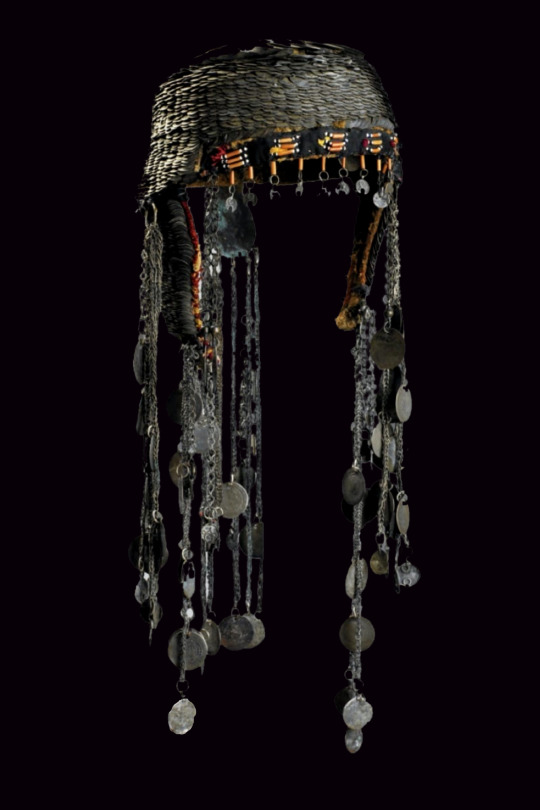

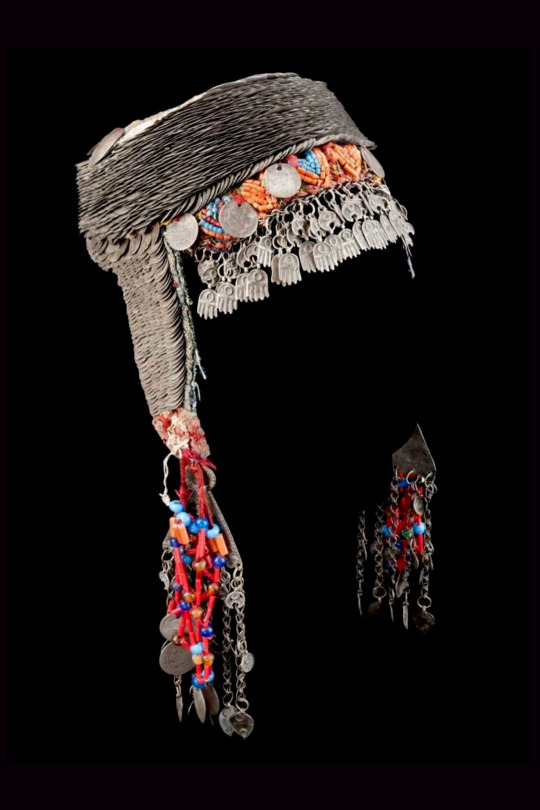

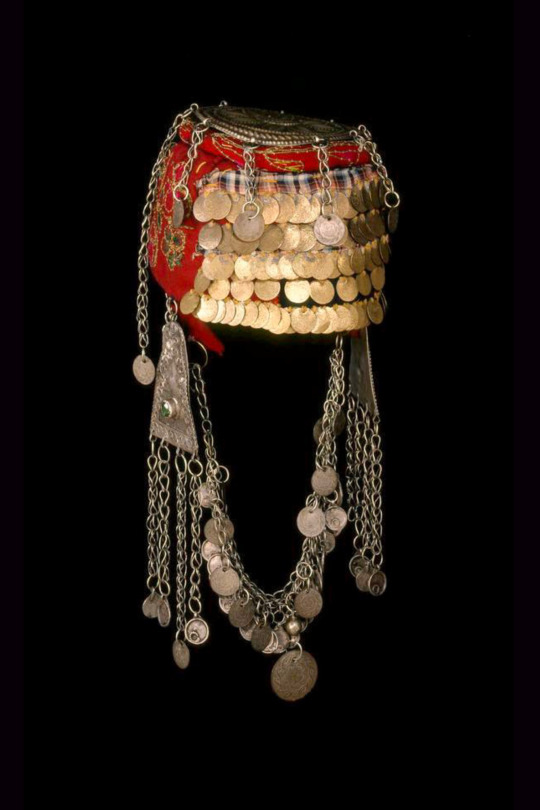

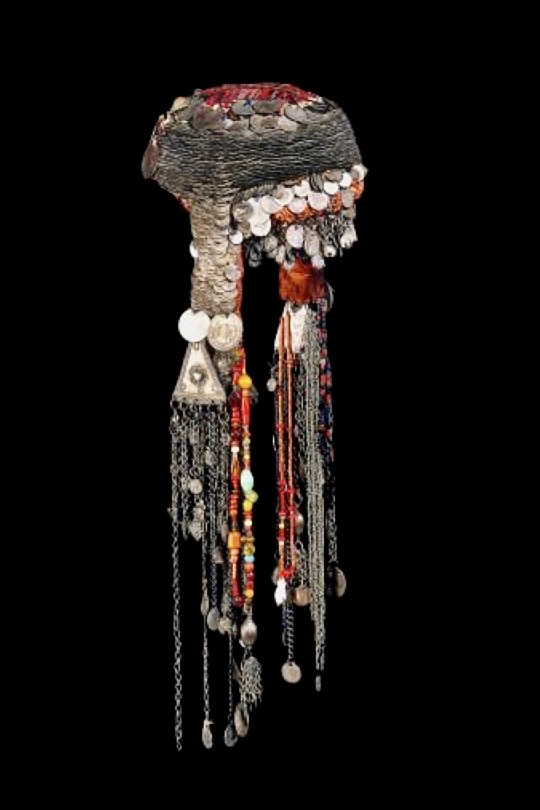
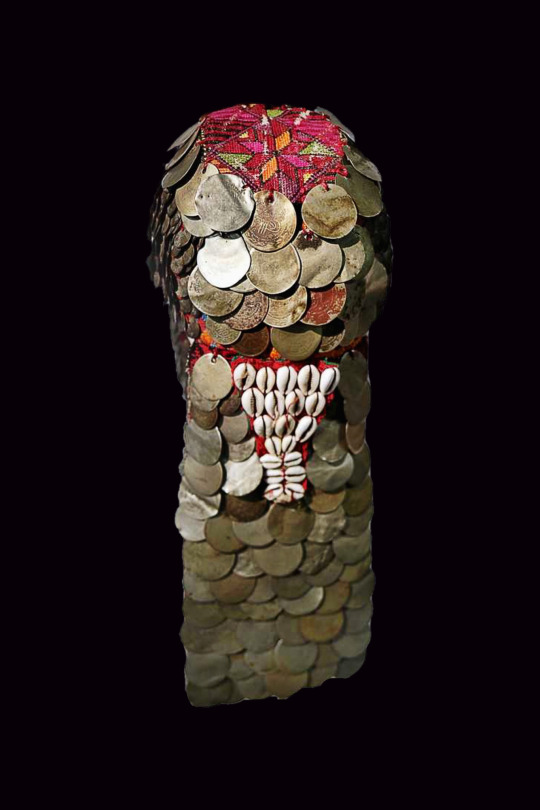
Palestinian Headdresses - (shatweh/wuqayat al-darahim)
“With numerous beads, ottoman coins, charms and pendants, the headdress shielded a bride from the ‘eye of envy’ when she was most vulnerable”
5K notes
·
View notes
Text
Semi-Canonical Gender & Sexuality Elvhen Terms / Phrases
I’m calling these semi-canonical, because I have created them by deconstructing the canon elvhen dictionary. Explanations of which, can be found below the cut.
I did this for my fic, (there is an important side-character who is gender fluid) but decided to just make a post for it in case anyone else would like to use them.
Please feel free to share your thoughts on this!
Keep reading
1K notes
·
View notes
Text
I was drawing a bunch of pentagrams in my notebook during math class because I was bored and I think I drew 150 pentagrams in total before a devilish-looking guy wearing a red suit broke down the door of the classroom and yelled “wHAT the fUCK do you wANT?!”
390K notes
·
View notes
Text
Team “not actually oblivious to flirting, just terrified of appearing presumptuous” represent.
233K notes
·
View notes
Text
the blessing and curse of having taken so much time away from doing anything actively with these characters is i’ve come back to them with a fresh mind and i can rework their backstories/choices/etc etc and make things work better and restructure/cut out things that have been hanging on from extremely early versions that are really no long valid/making things messier
but it also means that people like thenvas are up in the air on if i wanna keep them bc i am not.... vibing with how his character is naturally progressing and his interactions with people and shit so like....it creates a fun dilemma while working on ppl like inan like... do i write him out completely from her story bc he might be scraped or reworked into who knows what? or leave him in and just edit later? or hold off on working on inan until he’s sorted out????
#gen hell#i mean i'm not fucking waiting until he's sorted to work on inan so lol fuck that#i'm probably just gonna remove mentions of him until further notice#a lot of my side characters for my ocs are all in flux rn bc the break really highlighted like... who was working who wasnt n who's Solid
0 notes
Photo
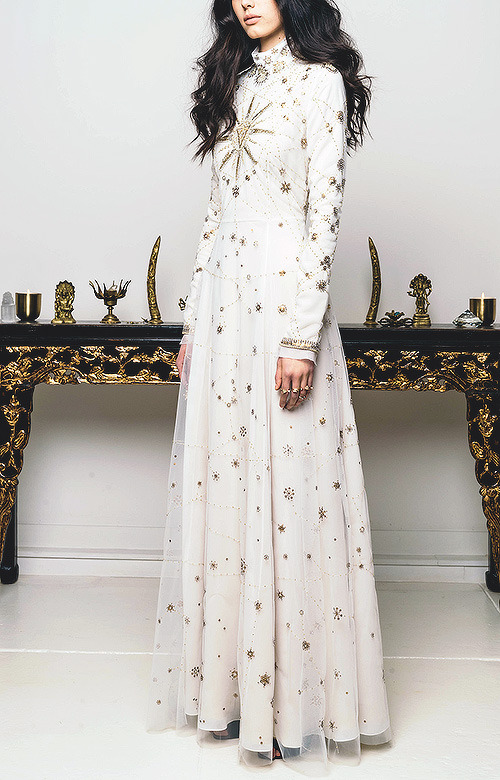
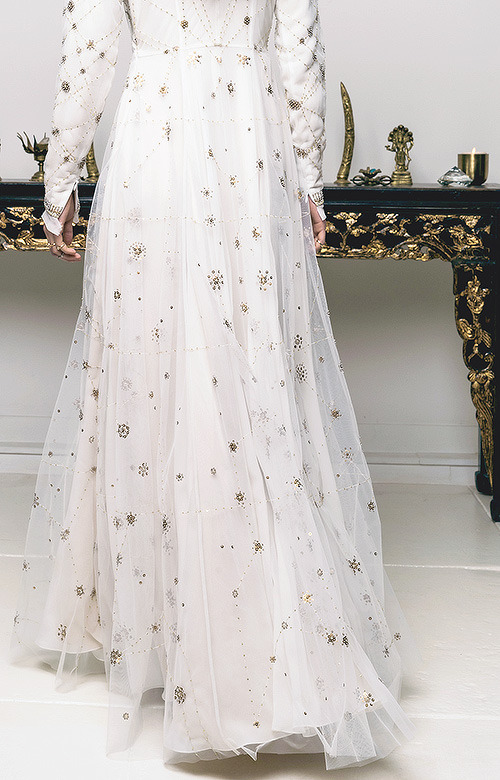
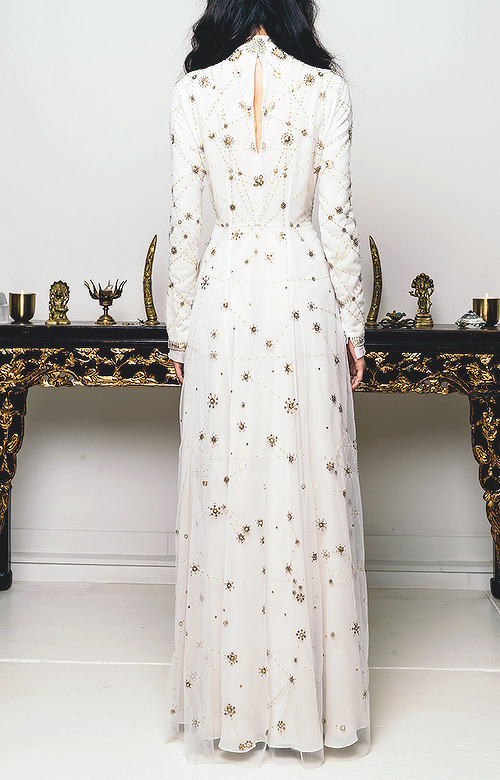

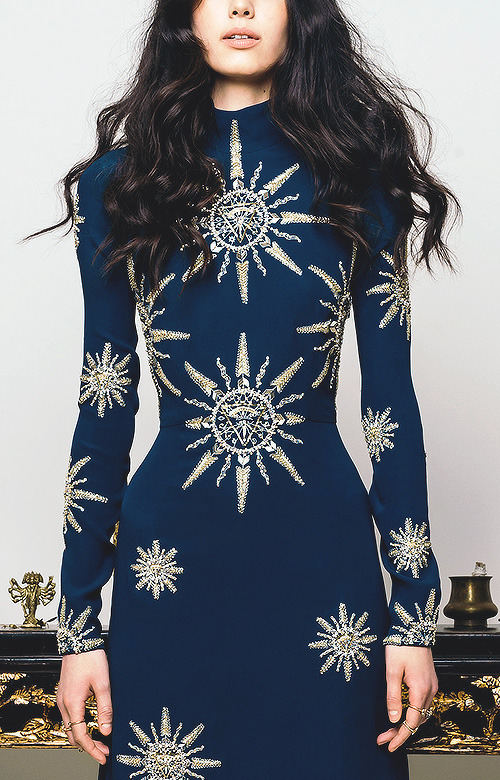
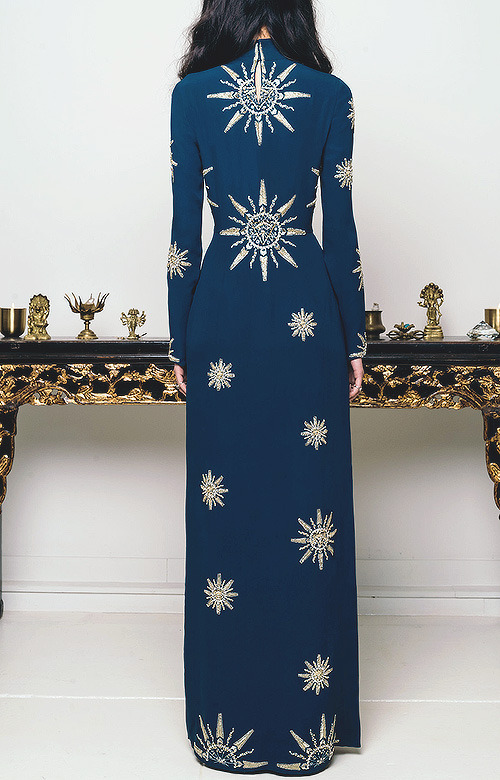
Cucculelli Shaheen “Alchemy & Mysticism” Fall 2017 Ready-to-Wear Collection
13K notes
·
View notes
Text
I just need someone, somewhere in the narrative, to acknowledge that Dalish society is going to be really fucking complex, okay… Moved to Dreamwidth
5K notes
·
View notes